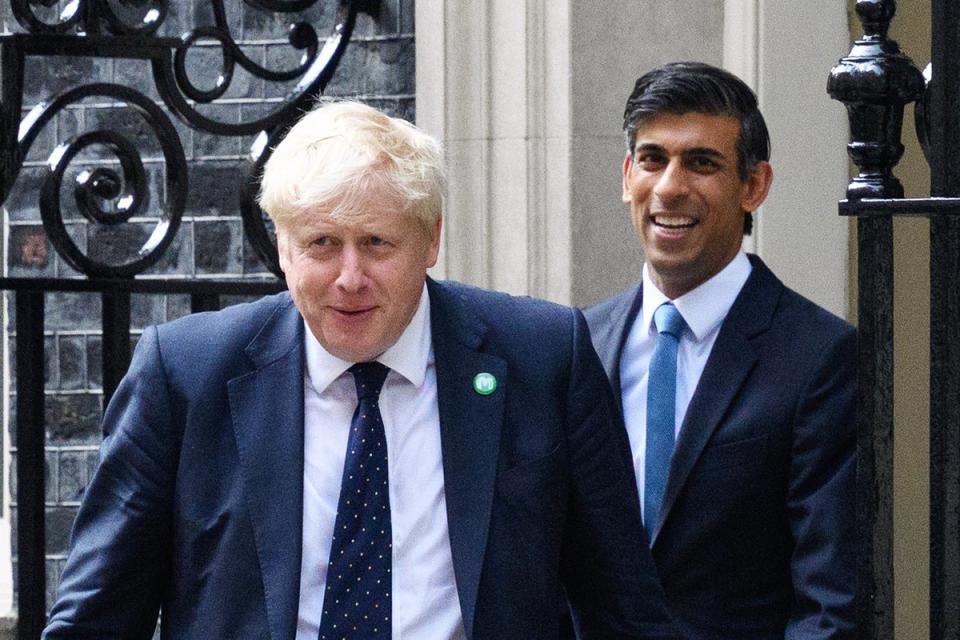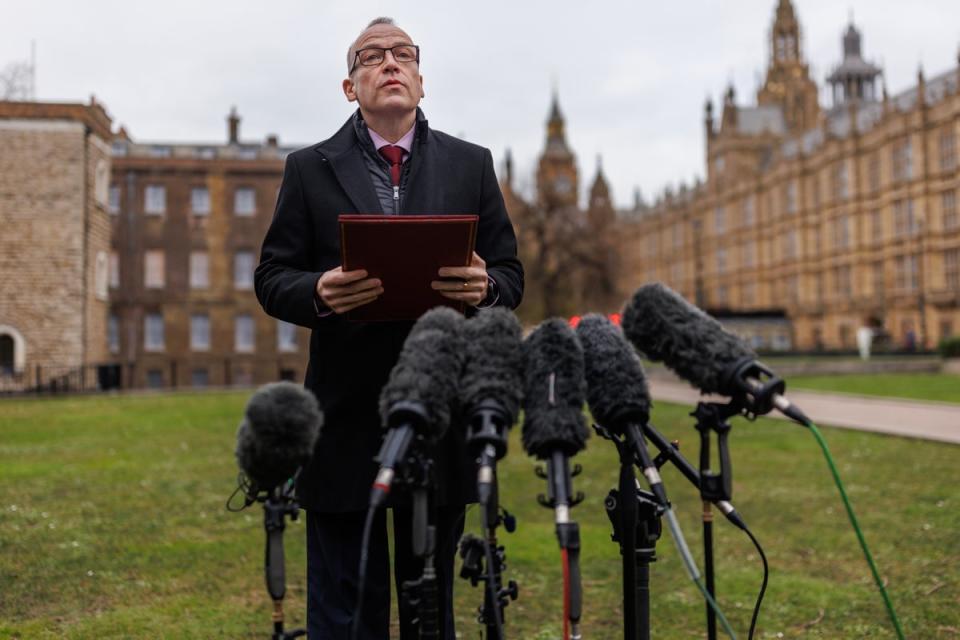Boris Johnson has attacked Rishi Sunak’s new Brexit deal with the DUP – warning it could bind the UK to future EU trade rules.
Mr Sunak’s government has unveiled new arrangements to remove routine checks on goods moving from Great Britain to Northern Ireland in a bid to restore power sharing at Stormont.
Checks required under the previous “green lane” will be further reduced – a tweak aimed at fixing some of the unresolved mess left by Mr Johnson’s Brexit deal.
Despite effectively being an extension of his own deal, Mr Johnson joined Tory rebels in claiming the new arrangements could hamper Britain’s post-Brexit “freedom” to exit EU rules.
The former PM – who has repeatedly criticized Mr Sunak since being kicked out of No. 10 – for his successor to have the “courage” to loosen more regulations from Brussels.
“We need to maintain the desire and courage to move away from the European model of high regulation and low growth,” Mr Johnson said on X, formerly known as Twitter.
“We must at all costs avoid a return to anything remotely like the disastrous ‘Chequers’ formula, which uses artificial concerns about the border between Northern Ireland and Ireland to keep the whole of the UK in line with the rules of the EU.”

Mr Johnson’s former Brexit negotiator Lord David Frost – believed to be part of a small cabal of right-wing MPs and former advisers plotting to bring down Mr Sunak – said he agreed with the former PM .
Troubled Tory peers have warned that the new deal with the DUP should not “slow down” the push to leave the EU.
Under the new measure set out in Mr Sunak’s paper “Defending the Union”, the “red lane” will remain for transporting goods from Great Britain to the NI, and then into the EU’s single market in the Republic of Ireland.
But normal checks of the “green lane” will be removed on goods from Great Britain destined to stay in Northern Ireland, and only occasional checks will be carried out in their place when “risks of smuggling and disease” are suspected.
The old green lane will be rebranded as the “UK internal market system”. And the government estimates that 80 percent of goods will now move free of routine checks.
The government has pledged to amend domestic law – specifically a section of the European Union (Withdrawal) Act – to ensure that new EU laws will not automatically apply in Northern Ireland, and must be initially by Stormont supervision.
In order to keep both the DUP and the Brexiteers happy to allow the UK to diverge from EU standards, there is also a legal requirement that any new legislation be assessed to see if it “affects trade between Northern Ireland and Britain Big”.


But some Brexiteer MPs remain skeptical. Former home secretary Priti Patel and former business secretary Sir Jacob Rees-Mogg challenged Northern Ireland secretary Chris Heaton-Harris to explain how the UK would be able to vary EU rules without jeopardizing arrangements for Northern Ireland.
Answering their questions in the House of Commons, Mr Heaton-Harris insisted that the deal did not “change the freedoms and powers we got through Brexit”. The Minister said: “It will not reduce our ability to make a difference.”
But right-wing colleague Theresa Villiers – a former Northern Ireland secretary – said she was “troubled” by the deal and that it looked likely to get through parliament. “It is vital that there is nothing in the agreement that prevents Great Britain from departing from EU rules,” she said The Telegraph.
However, DUP leader Jeffrey Donaldson has proposed the plan, claiming it would destroy the controversial Irish Sea border for goods. “There should not be a border within the UK internal market,” he said. “These proposals remove that limitation.”
Sir Jeffrey praised Mr Sunak for going further than Mr Johnson. “Although Boris Johnson promised us many things, he did not deliver them. Rishi Sunak worked with us, [Mr Heaton-Harris] he worked with us, to make these changes,” the DUP leader told the BBC.
The DUP has agreed to end the two-year blockade of Stormont but there are those within the unionist party who are deeply skeptical of the proposed agreement.
Sammy Wilson, who spoke the most, said the UK would still have to follow EU rules. “This is the result of the feckless, weak-kneed, Brexit-betraying government – refusing to engage with the EU and include Northern Ireland.”


The legislation promised in the agreement is to be fast-tracked through parliament on Thursday to allow the institutions to be reformed in Stormont – possibly as early as Saturday.
Number 10 has argued that the DUP’s deal would not mean the Windsor Framework Agreement struck by Mr Sunak with EU Commission president Ursula von der Leyen would not have to be reopened.
Downing Street said on Wednesday that the agreement contains “significant” changes to the “operation” of the Windsor Agreement but does not intend to change the “fundamentals” of the framework.
The European Commission effectively endorsed the new arrangement by saying it had arrived “after intensive technical discussions with the UK”. Deputy President Maros Sefcovic said on Wednesday that it “responds to the needs of Northern Ireland businesses while protecting our single market”.
And Micheal Martin, deputy PM of the Republic of Ireland, does not expect the European Commission to object to Sunak’s new plan, saying: “I don’t think there will be any particular difficulties with the EU.”
It came as Tory minister Andrea Leadsom dismissed business leaders’ concerns about costly new checks imposed on EU imports – calling them the “price you pay” for Brexit.
The Brexiteer told Times Radio that British businesses must “adapt” to the new rules that started on Wednesday, and suggested they should even consider “changing their trading arrangements with the EU” if they were struggling.
Nigel Jenny from the Fresh Produce Consortium (FPC) warned that the checks on food and plant importers would essentially be a £200m tax on the industry and would raise prices for consumers.
And said Paolo Arrigo, managing director of London-based importer Seeds of Italy The Independent that the new checks were “small countermeasures” and that they were now easier to import from China than France.